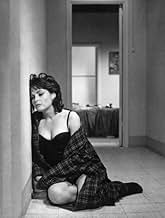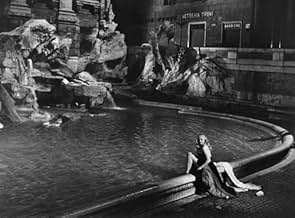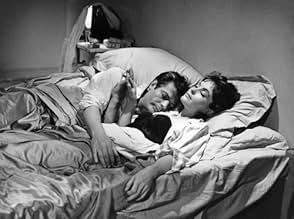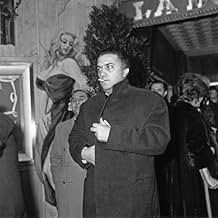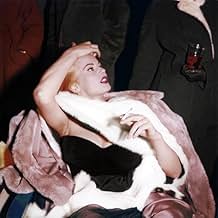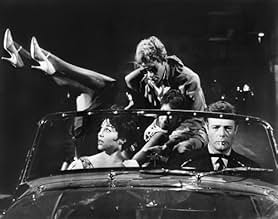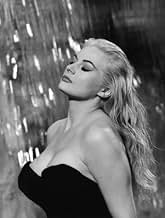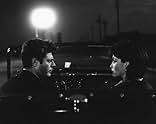La dolce vita
- 1960
- Tous publics
- 2h 54min
Une série d'histoires au fil d'une semaine dans la vie d'un paparazzi coureur de jupons vivant à Rome.Une série d'histoires au fil d'une semaine dans la vie d'un paparazzi coureur de jupons vivant à Rome.Une série d'histoires au fil d'une semaine dans la vie d'un paparazzi coureur de jupons vivant à Rome.
- Réalisation
- Scénario
- Casting principal
- Récompensé par 1 Oscar
- 11 victoires et 12 nominations au total
Anouk Aimée
- Maddalena
- (as Anouk Aimee)
Magali Noël
- Fanny
- (as Magali Noel)
Résumé
Reviewers say 'La Dolce Vita' delves into themes of fame, decadence, and the superficiality of celebrity culture, using these characters to underscore the contrasts and contradictions within high society. The portrayal of it's characters enhances the film's satirical and critical perspective on the lifestyles and attitudes of the era, offering a nuanced commentary on the nature of fame and its impact on individuals and society.
Avis à la une
Marcello Rubini (Marcello Mastroianni) is a man-about-town and a gossip journalist in Rome. His girlfriend Emma overdoses and recovers. Swedish-American bombshell Sylvia (Anita Ekberg) arrives and hangs out with Marcello while the Paparazzo hounds them. Her boyfriend Robert gets angry and hits him. As his series of adventures continue, there is an emptiness to it all and a meaninglessness to his life.
This iconic film has a disjointed narrative structure. It has many sections without the connective tissue. It's a tough watch especially for a three hour movie. It's exhilarating for a long time but it gets tiring by the end. The sad emptiness infects the viewing experience. The lifestyle is thoroughly modern celebrity world. The thrill disapates. Its iconic nature deserves extra points, but this is strictly for film fans.
This iconic film has a disjointed narrative structure. It has many sections without the connective tissue. It's a tough watch especially for a three hour movie. It's exhilarating for a long time but it gets tiring by the end. The sad emptiness infects the viewing experience. The lifestyle is thoroughly modern celebrity world. The thrill disapates. Its iconic nature deserves extra points, but this is strictly for film fans.
Federico Fellini's "La Dolce Vita" transcends the boundaries of conventional cinema, presenting itself as an immersive odyssey that delves into the decadence of Rome's privileged class amidst Italy's post-war economic resurgence. It offers a poignant discourse on the complexities of human existence, woven into the fabric of its narrative.
The film, shot beautifully in black and white, unfolds over seven decadent and disjointed episodes. At its center is Marcello Rubini (played by Marcello Mastroianni), a hedonistic journalist who navigates the labyrinth of Rome's high society, constantly torn between the pursuit of serious literature and the allure of trivial journalism. The episodic structure allows Fellini to weave a rich tapestry of characters and incidents, all of which add to the decadence and the gradual moral decline that is "la dolce vita".
One cannot talk about "La Dolce Vita" without mentioning its iconic Trevi Fountain scene. Anita Ekberg, playing the vivacious actress Sylvia, steps into the fountain with complete abandon, and in doing so, becomes the embodiment of a carefree, unattainable ideal. Marcello's attempts to join her and his eventual failure is symbolic of his constant struggle to attain fulfillment, mirroring the film's larger theme of the fruitless pursuit of happiness in a world that equates it with decadence.
Fellini cleverly uses a blend of surrealism and neo-realism to convey the superficial allure of the hedonistic lifestyle. The luxurious parties, the flippant attitudes, and the grandeur of Rome itself are contrasted starkly with the characters' internal void and loneliness. This duality is personified in Marcello, whose transformation from an ambitious writer to a frivolous gossip columnist is both tragic and unsettling.
The most remarkable aspect of "La Dolce Vita" is arguably the poignant ending. Marcello, now a part of the world he once viewed with a mix of fascination and contempt, witnesses a grotesque sea creature being hauled onto the shore. The creature, monstrous and out of place, symbolizes the death of innocence and Marcello's final surrender to the 'sweet life'. The ending of this story is left unresolved, provoking us to contemplate our own quests for contentment. The feeling of emptiness and hollowness it incites makes us think deeply about our pursuit of happiness.
One must not overlook Fellini's mastery over the medium of cinema when discussing "La Dolce Vita". His stylistic prowess, characterized by long, meandering takes and a persistent undertone of surrealism, encapsulates the viewer in the film's world. The cinematography elegantly captures the splendor and squalor of Rome, while its iconic score by Nino Rota perfectly complements the visual narrative. Together, they create an immersive atmosphere that blurs the boundary between reality and illusion, much like the lives of the characters on screen.
Furthermore, Fellini's use of religious and mythological symbolism adds a layer of depth to the narrative. He draws parallels between Marcello's journey and Dante's "Divine Comedy," subtly suggesting a descent into a modern, urban Hell characterized by superficiality and debauchery. Iconic scenes, like the statue of Christ being flown over Rome, bring a sense of irony and critique, underscoring the clash between traditional values and the emerging, materialistic culture.
The film's ensemble cast is worth noting, each bringing their character to life with stunning authenticity. The performances are all commendable, but it is Marcello Mastroianni's nuanced portrayal of Marcello that truly anchors the film. Mastroianni embodies the charisma and inner conflict of his character with such finesse that his struggles become palpable, and his moral decline is both believable and deeply affecting.
Moreover, Fellini takes a critical look at the role of media, a theme that feels incredibly relevant even today. Marcello's journalistic exploits are shown as invasive and unethical, often leading to tragic outcomes. The film takes jabs at the sensationalism that often overshadows the pursuit of truth in journalism, highlighting how it contributes to the moral degradation of society.
Overall, "La Dolce Vita" goes beyond its surface-level portrayal of a glamorous yet hollow lifestyle. It serves as a cautionary tale, a sociopolitical critique, and a philosophical exploration of life's meaning. Fellini's deft handling of complex themes and his innovative narrative and visual techniques have cemented "La Dolce Vita" as an enduring piece of cinematic art. It is not just a film, but a mirror held up to society, reflecting its allure and its flaws with equal clarity.
In the pantheon of cinematic masterpieces, Fellini's "La Dolce Vita" stands as a timeless testament to the power of storytelling. It skillfully interweaves a tale of moral struggle, societal critique, and philosophical exploration of life's meaning in a changing world, with Marcello Mastroianni's tour de force performance at its heart.
Fellini's stylistic mastery over the medium, marked by long, wandering takes and a subtle undertone of surrealism, engulfs the viewer in the film's world. The splendor and squalor of Rome are captured elegantly by the cinematography, mirrored by Nino Rota's iconic score, which provides an aural landscape as complex and compelling as the visual one. Together, they generate an atmospheric blur between reality and illusion, echoing the lives of the characters within.
It is within this context that Marcello Mastroianni delivers a captivating performance. As Marcello Rubini, Mastroianni becomes a figure emblematic of modern dilemmas - a man torn between professional ambition and personal ennui, between hedonistic pleasure and spiritual fulfillment. His nuanced performance creates a Marcello who is at once charismatic and confounding, inviting both empathy and critique from the audience. Mastroianni's finesse in embodying this inner conflict and moral decline anchors the film, making Marcello's struggles palpable and his eventual descent into emptiness deeply affecting.
Fellini's profound use of religious and mythological symbolism further deepens the narrative. References to Dante's "Divine Comedy" subtly draw a parallel between Marcello's journey and a descent into a modern, urban Hell defined by superficiality and moral decay. Ironical images, like the statue of Christ flown over Rome, underscore the clash between traditional values and the emerging culture of materialism.
Not to be overlooked is Fellini's sharp critique of media's role. Portraying Marcello's journalistic ventures as intrusive and unethical, the film highlights the potentially damaging effects of sensationalism overshadowing the pursuit of truth - a commentary that remains remarkably relevant today.
"La Dolce Vita" thus transcends its portrayal of a glitzy yet hollow lifestyle to deliver a cautionary tale that resonates on multiple levels. The film's enduring appeal lies not only in Fellini's innovative narrative and visual techniques but also in the strength of performances, most notably Mastroianni's. In its entirety, "La Dolce Vita" remains not just a film, but a reflective surface for society, casting both its allure and its flaws into sharp relief.
In conclusion, Fellini's "La Dolce Vita" is a timeless masterpiece. It masterfully intertwines imagery, symbolism, and narrative to create a commentary on the emptiness of excess and the illusion of fulfillment. This movie does more than just entertain; it encourages deep thinking and introspection, making it a truly one-of-a-kind experience. Its capacity to stimulate meaningful thinking is its true strength. It takes you on an exploration into humanity's innermost motivations and dissatisfactions.
The film, shot beautifully in black and white, unfolds over seven decadent and disjointed episodes. At its center is Marcello Rubini (played by Marcello Mastroianni), a hedonistic journalist who navigates the labyrinth of Rome's high society, constantly torn between the pursuit of serious literature and the allure of trivial journalism. The episodic structure allows Fellini to weave a rich tapestry of characters and incidents, all of which add to the decadence and the gradual moral decline that is "la dolce vita".
One cannot talk about "La Dolce Vita" without mentioning its iconic Trevi Fountain scene. Anita Ekberg, playing the vivacious actress Sylvia, steps into the fountain with complete abandon, and in doing so, becomes the embodiment of a carefree, unattainable ideal. Marcello's attempts to join her and his eventual failure is symbolic of his constant struggle to attain fulfillment, mirroring the film's larger theme of the fruitless pursuit of happiness in a world that equates it with decadence.
Fellini cleverly uses a blend of surrealism and neo-realism to convey the superficial allure of the hedonistic lifestyle. The luxurious parties, the flippant attitudes, and the grandeur of Rome itself are contrasted starkly with the characters' internal void and loneliness. This duality is personified in Marcello, whose transformation from an ambitious writer to a frivolous gossip columnist is both tragic and unsettling.
The most remarkable aspect of "La Dolce Vita" is arguably the poignant ending. Marcello, now a part of the world he once viewed with a mix of fascination and contempt, witnesses a grotesque sea creature being hauled onto the shore. The creature, monstrous and out of place, symbolizes the death of innocence and Marcello's final surrender to the 'sweet life'. The ending of this story is left unresolved, provoking us to contemplate our own quests for contentment. The feeling of emptiness and hollowness it incites makes us think deeply about our pursuit of happiness.
One must not overlook Fellini's mastery over the medium of cinema when discussing "La Dolce Vita". His stylistic prowess, characterized by long, meandering takes and a persistent undertone of surrealism, encapsulates the viewer in the film's world. The cinematography elegantly captures the splendor and squalor of Rome, while its iconic score by Nino Rota perfectly complements the visual narrative. Together, they create an immersive atmosphere that blurs the boundary between reality and illusion, much like the lives of the characters on screen.
Furthermore, Fellini's use of religious and mythological symbolism adds a layer of depth to the narrative. He draws parallels between Marcello's journey and Dante's "Divine Comedy," subtly suggesting a descent into a modern, urban Hell characterized by superficiality and debauchery. Iconic scenes, like the statue of Christ being flown over Rome, bring a sense of irony and critique, underscoring the clash between traditional values and the emerging, materialistic culture.
The film's ensemble cast is worth noting, each bringing their character to life with stunning authenticity. The performances are all commendable, but it is Marcello Mastroianni's nuanced portrayal of Marcello that truly anchors the film. Mastroianni embodies the charisma and inner conflict of his character with such finesse that his struggles become palpable, and his moral decline is both believable and deeply affecting.
Moreover, Fellini takes a critical look at the role of media, a theme that feels incredibly relevant even today. Marcello's journalistic exploits are shown as invasive and unethical, often leading to tragic outcomes. The film takes jabs at the sensationalism that often overshadows the pursuit of truth in journalism, highlighting how it contributes to the moral degradation of society.
Overall, "La Dolce Vita" goes beyond its surface-level portrayal of a glamorous yet hollow lifestyle. It serves as a cautionary tale, a sociopolitical critique, and a philosophical exploration of life's meaning. Fellini's deft handling of complex themes and his innovative narrative and visual techniques have cemented "La Dolce Vita" as an enduring piece of cinematic art. It is not just a film, but a mirror held up to society, reflecting its allure and its flaws with equal clarity.
In the pantheon of cinematic masterpieces, Fellini's "La Dolce Vita" stands as a timeless testament to the power of storytelling. It skillfully interweaves a tale of moral struggle, societal critique, and philosophical exploration of life's meaning in a changing world, with Marcello Mastroianni's tour de force performance at its heart.
Fellini's stylistic mastery over the medium, marked by long, wandering takes and a subtle undertone of surrealism, engulfs the viewer in the film's world. The splendor and squalor of Rome are captured elegantly by the cinematography, mirrored by Nino Rota's iconic score, which provides an aural landscape as complex and compelling as the visual one. Together, they generate an atmospheric blur between reality and illusion, echoing the lives of the characters within.
It is within this context that Marcello Mastroianni delivers a captivating performance. As Marcello Rubini, Mastroianni becomes a figure emblematic of modern dilemmas - a man torn between professional ambition and personal ennui, between hedonistic pleasure and spiritual fulfillment. His nuanced performance creates a Marcello who is at once charismatic and confounding, inviting both empathy and critique from the audience. Mastroianni's finesse in embodying this inner conflict and moral decline anchors the film, making Marcello's struggles palpable and his eventual descent into emptiness deeply affecting.
Fellini's profound use of religious and mythological symbolism further deepens the narrative. References to Dante's "Divine Comedy" subtly draw a parallel between Marcello's journey and a descent into a modern, urban Hell defined by superficiality and moral decay. Ironical images, like the statue of Christ flown over Rome, underscore the clash between traditional values and the emerging culture of materialism.
Not to be overlooked is Fellini's sharp critique of media's role. Portraying Marcello's journalistic ventures as intrusive and unethical, the film highlights the potentially damaging effects of sensationalism overshadowing the pursuit of truth - a commentary that remains remarkably relevant today.
"La Dolce Vita" thus transcends its portrayal of a glitzy yet hollow lifestyle to deliver a cautionary tale that resonates on multiple levels. The film's enduring appeal lies not only in Fellini's innovative narrative and visual techniques but also in the strength of performances, most notably Mastroianni's. In its entirety, "La Dolce Vita" remains not just a film, but a reflective surface for society, casting both its allure and its flaws into sharp relief.
In conclusion, Fellini's "La Dolce Vita" is a timeless masterpiece. It masterfully intertwines imagery, symbolism, and narrative to create a commentary on the emptiness of excess and the illusion of fulfillment. This movie does more than just entertain; it encourages deep thinking and introspection, making it a truly one-of-a-kind experience. Its capacity to stimulate meaningful thinking is its true strength. It takes you on an exploration into humanity's innermost motivations and dissatisfactions.
I first saw this movie probably over 25 years ago when I was quite a bit younger. At that point I enjoyed it for its party scenes, sense of joy and life and vitality and....Marcello Mastroianni. Now that I'm older myself and have just recently seen the movie again, I find that I have a much deeper understanding of it. Maybe it takes some age to find some meaning. In a nutshell, Marcello is at a crossroads in his life, he's unable to settle down or move foreward into any direction - he's a diletante with aspirations but no real goals. He's wrapped up in himself and in projecting rather dreamy ideals onto other people. But as he keeps projecting on to others he comes to find in each situation that he doesn't really know the person and they are a mystery and probably a disappointment to him. certainly steiner is the biggest disappointment and disillusions him to a degree that he is apparently lost to a life of corruption and decadence as a result. but it's not that these people are difficult to understand to someone other than marcello - i think we can see that anita ekberg's character really is just a big good-natured blond and not the mysterious goddess marcello makes her out to be; his father is again - the typical traveling salesman and perhaps not the paternal figure that marcello would like him to be. his amour maddelena lives up to her name even as marcello starts believing himself in love with her - he's literally seduced by nothing more than an image he creates in his own mind. his friend steiner seems to have it all to marcello and to be the renaissance man that he would like to be - but, of course, he is dissatisfied and disturbed and we see what the end is. the only one whom marcello forms a somewhat realistic connection with is his girlfriend whom he treats badly and neglects despite her obvious love for him. he refuses to actually work on the one relationship that he could actually succeed at - he would rather dream about possibilities than actualize something.
marcello cannot communicate with others because he cannot see them as the people they really are - he just sees them as projections of his own needs, aspirations, desires and goals. when he finds out what they're really like, he either turns away or falls apart. this is an outstanding movie - 10 out of 10 and beautifully photographed. if you don't get it now, try again in 10 years - it will wait for you to catch up.
marcello cannot communicate with others because he cannot see them as the people they really are - he just sees them as projections of his own needs, aspirations, desires and goals. when he finds out what they're really like, he either turns away or falls apart. this is an outstanding movie - 10 out of 10 and beautifully photographed. if you don't get it now, try again in 10 years - it will wait for you to catch up.
I just saw a new print of this wonderful film after not having seen it for maybe 20 years and it is still spellbinding. Fellini sums up an era and an attitude here, and succeeds in doing something that ought to be impossible: he makes a full and meaningful film about empty and meaningless lives. Mastroianni seems to have been to Fellini what DeNiro has been to Scorsese--a perfect embodiment of a personal vision. What a wonderful actor he was--brilliant in his youth and in his age. Many other performers are hardly less fine here, and the cinematography and composition are stunning throughout. There are so many indelible images from this film, images that have become iconic over the decades: Ekberg in the Fontana di Trevi, the statue of Christ flying over Rome, the astonishing, candlelit procession at the castle, to name a few. It seems plot less and yet it isn't plot less at all; Marcello's ultimately fruitless search for meaning, a search that he abandons in the end, as he stares across a slight and yet unbridgable abyss on the beach at a lovely young girl who seems to possess the knowledge and understanding that is denied to him. I'm astonished at the number of people who don't get this movie, who seem to think that Fellini expects us to admire the bizarre characters who people the film, or who think that a movie about worthless individuals must be a worthless movie, or who don't seem to understand that movies that are full of what become clichés usually do so because they capture an important vision. Fellini made several exceptional films: 81/2, La Strada, Amarcord, and The Nights of Cabiria come to mind, but La Dolce Vita may be, when all is said and done, his masterwork.
Long, episodic film by Federico Fellini about the conceits and facades of life: fame, intellect, sex, friendship, despair, innocence, etc.
Marcello Mastroianni is perfect as the shallow tabloid reporter who joyfully follows around Rome a blonde movie star from Sweden (Anita Ekberg) as she prowls around the city's bars and bistros. He is also having an affair with a woman (Anouk Aimee) while his girl friend (Yvonne Furnaux) seems to be going nuts.
But as Marcello moves through the city following the movie star, the miracle of the virgin, a few parties, etc. we see that his life is very empty because the things he reports on are meaningless drivel. We see that fame and fortune and the trappings of success are meaningless.
Marcello starts to realize that the movie star is a vapid airhead, the miracles are a sham, and his friend's (who seemed quite happily married) ghastly murder and suicide show the futility of life itself.
The Fellini themes are common to many of his films, but what makes La Dolce Vita so memorable are the cynical tone, the Nina Rota music, and the string of terrific visual images.
The opening scene is of a helicopter hauling a gilded plaster statue through the air across Rome. The flying saint is a bizarre image but serves to set up the movies which is all about images and events that are never what they seem to be.
Notable are the scenes of statuesque Ekberg in that terrific strapless black dress with the voluminous skirts as she swishes around dancing and eventually wading through a city fountain. The party scenes are also notable. The first because of the intolerable intellectuals who sits around and talk and talk but never do anything. The last party has the indelible image of Mastroianni "riding" a drunken blonde woman as though she were a horse. The final image of the giant dead fish is quite unsettling as it symbolizes their bloated lives.
Fellini is brilliant in filling scenes with odd people as extras, usually hideously dressed or wearing ugly glasses. The "gallery" of people who inhabit the city is one of grotesques, vapid fashion slaves, the rich, hangers on, etc.
A long film, but highly recommended and very memorable.
Marcello Mastroianni is perfect as the shallow tabloid reporter who joyfully follows around Rome a blonde movie star from Sweden (Anita Ekberg) as she prowls around the city's bars and bistros. He is also having an affair with a woman (Anouk Aimee) while his girl friend (Yvonne Furnaux) seems to be going nuts.
But as Marcello moves through the city following the movie star, the miracle of the virgin, a few parties, etc. we see that his life is very empty because the things he reports on are meaningless drivel. We see that fame and fortune and the trappings of success are meaningless.
Marcello starts to realize that the movie star is a vapid airhead, the miracles are a sham, and his friend's (who seemed quite happily married) ghastly murder and suicide show the futility of life itself.
The Fellini themes are common to many of his films, but what makes La Dolce Vita so memorable are the cynical tone, the Nina Rota music, and the string of terrific visual images.
The opening scene is of a helicopter hauling a gilded plaster statue through the air across Rome. The flying saint is a bizarre image but serves to set up the movies which is all about images and events that are never what they seem to be.
Notable are the scenes of statuesque Ekberg in that terrific strapless black dress with the voluminous skirts as she swishes around dancing and eventually wading through a city fountain. The party scenes are also notable. The first because of the intolerable intellectuals who sits around and talk and talk but never do anything. The last party has the indelible image of Mastroianni "riding" a drunken blonde woman as though she were a horse. The final image of the giant dead fish is quite unsettling as it symbolizes their bloated lives.
Fellini is brilliant in filling scenes with odd people as extras, usually hideously dressed or wearing ugly glasses. The "gallery" of people who inhabit the city is one of grotesques, vapid fashion slaves, the rich, hangers on, etc.
A long film, but highly recommended and very memorable.
Le saviez-vous
- AnecdotesThe famous scene in the Trevi Fountain was shot over a week in March, when nights were still cold. According to Federico Fellini (in an interview with Costanzo Costantini), Anita Ekberg stood in the cold water in her dress for hours with no trouble. Marcello Mastroianni, on the other hand, had to wear a wetsuit beneath his clothes, and even that wasn't enough. Still freezing, he downed an entire bottle of vodka, so he was completely drunk while shooting the scene.
- GaffesWhen Marcello and Maddalena arrive at the prostitute's apartment, a long electric cable (light?) can be seen attached to the right rear of the car, moving along until the car stops.
- Versions alternativesIn the original American release, distributed by American International Pictures, the titles open with the AIP logo and appear over a shot of the sky with clouds. In the current release on DVD - and as shown on TCM - the title sequence is over a black background. When originally released, censors in several countries trimmed certain scenes, including the orgy near the end of the film.
- ConnexionsEdited into La case du siècle: Cinecittà, de Mussolini à la Dolce Vita (2021)
Meilleurs choix
Connectez-vous pour évaluer et suivre la liste de favoris afin de recevoir des recommandations personnalisées
Détails
- Date de sortie
- Pays d’origine
- Site officiel
- Langues
- Aussi connu sous le nom de
- La douceur de vivre
- Lieux de tournage
- Villa Giustiniani-Odescalchi, Bassano Romano, Viterbo, Lazio, Italie(abandoned castle scenes)
- Sociétés de production
- Voir plus de crédits d'entreprise sur IMDbPro
Box-office
- Montant brut mondial
- 217 420 $US
- Durée2 heures 54 minutes
- Couleur
- Rapport de forme
- 2.35 : 1
Contribuer à cette page
Suggérer une modification ou ajouter du contenu manquant


![Regarder Trailer [English SUB]](https://m.media-amazon.com/images/M/MV5BNjE3MTU3OTItN2I0NS00YzU2LWE1ZTctZDQ3Y2I1NDc4MGMxXkEyXkFqcGdeQXRyYW5zY29kZS13b3JrZmxvdw@@._V1_QL75_UX500_CR0)
![La Dolce Vita: [2-Disc Collectors Edition]](https://m.media-amazon.com/images/M/MV5BZTY2ZTg3YmEtZDZkMS00MmFkLThhMjItMWVmN2NlNmJhZGZjXkEyXkFqcGdeQXVyNzU1NzE3NTg@._V1_QL75_UX500_CR0)

